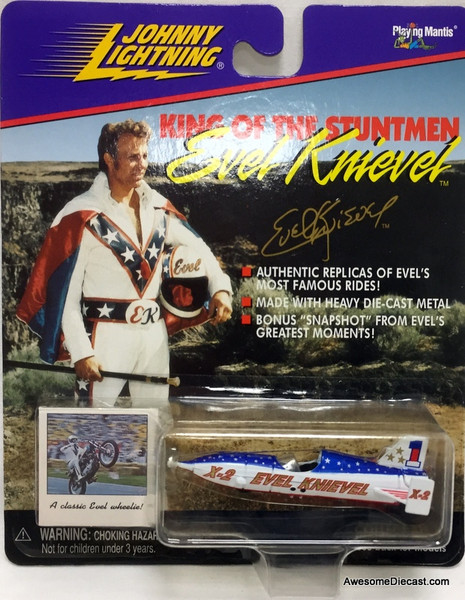Johnny Lightning 1:64 Set Of 4 Stunt Vehicles: Evil Knievel

Johnny Lightning 1:64 Set Of 4 Stunt Vehicles: Evil Knievel
$86.47
This is a 4 vehicle set:
Caesar's Palace motor cycle
Snake River Canyon X-2 Sky cycle
Custom Aston Martin sports car
Robert Craig Knievel, professionally known as Evel Knievel, was an American stunt performer and entertainer. Over the course of his career, he attempted more than 75 ramp-to-ramp motorcycle jumps.
Knievel was inducted into the Motorcycle Hall of Fame in 1999. He died of pulmonary disease in Clearwater, Florida, in 2007, aged 69.
Knievel was born on October 17, 1938, in Butte, Montana, the first of two children of Robert E. and Ann Marie Keough Knievel. His surname is of German origin; his paternal great-great-grandparents emigrated to the U.S. from Germany. His mother was of Irish ancestry. Robert and Ann divorced in 1940, after the 1939 birth of their second child, Nicolas, known as Nic. Both parents decided to leave Butte.
Knievel and his brother were raised in Butte by their paternal grandparents, Ignatius and Emma Knievel. At the age of eight, Knievel attended a Joie Chitwood auto daredevil show, to which he gave credit for his later career choice as a motorcycle daredevil. Knievel was a cousin of the former Democratic Congressman from Montana, Pat Williams
Knievel left Butte High School after his sophomore year and got a job in the copper mines as a diamond drill operator with the Anaconda Mining Company, but he preferred motorbiking to what he called "unimportant stuff". He was promoted to surface duty, where he drove a large earth mover. Knievel was fired when he made the earth mover do a motorcycle-type wheelie and drove it into Butte's main power line, leaving the city without electricity for several hours.
Always looking for new thrills and challenges, Knievel participated in local professional rodeos and ski jumping events, including winning the Northern Rocky Mountain Ski Association Class A Men's ski jumping championship in 1959. During the late 1950s, Knievel joined the United States Army. His athletic ability allowed him to join the track team, where he was a pole vaulter. After his army stint, Knievel returned to Butte, where he met and married his first wife, Linda Joan Bork. Shortly after getting married, Knievel started the Butte Bombers, a semi-pro hockey team.
To help promote his team and earn some money, he convinced the Czechoslovakian Olympic ice hockey team to play the Butte Bombers in a warm-up game to the 1960 Winter Olympics (to be held in California). Knievel was ejected from the game minutes into the third period and left the stadium. When the Czechoslovakian officials went to the box office to collect the expense money that the team was promised, workers discovered the game receipts had been stolen. The United States Olympic Committee ended up paying the Czechoslovakian team's expenses to avoid an international incident. Knievel tried out with the Charlotte Clippers of the Eastern Hockey League in 1959, but decided that a traveling team was not for him.
After the birth of his first son, Kelly, Knievel realized that he needed to come up with a new way to support his family financially. Using the hunting and fishing skills taught to him by his grandfather, Knievel started the Sur-Kill Guide Service. He guaranteed that if a hunter employed his service and paid his fee, he would get the big game animal desired or Knievel would refund his fee.
Knievel, who was learning about the culling of elk in Yellowstone, decided to hitchhike from Butte to Washington, D.C., in December 1961 to raise awareness and to have the elk relocated to areas where hunting was permitted. After his conspicuous trek (he hitchhiked with a 54-inch-wide (1.4 m) rack of elk antlers and a petition with 3,000 signatures), he presented his case to Representative Arnold Olsen, Senator Mike Mansfield, and Interior Secretary Stewart Udall. Culling was stopped in the late 1960s.
After returning home to the west from Washington, D.C., Knievel decided to stop committing crimes. He joined the motocross circuit and had moderate success, but he still could not make enough money to support his family. During 1962, Knievel broke his collarbone and shoulder in a motocross accident. The doctors said he could not race for at least six months. To help support his family, he switched careers and sold insurance for the Combined Insurance Company of America, working for W. Clement Stone. Stone suggested that Knievel read Success Through a Positive Mental Attitude, a book that Stone wrote with Napoleon Hill. Knievel credited much of his later success to Stone and his book.
Knievel was successful as an insurance salesman (even selling insurance policies to several institutionalized mental patients) and wanted recognition for his efforts. When the company refused to promote him to vice-president after he had been a few months on the job, he quit. Wanting a new start away from Butte, Knievel moved his family to Moses Lake, Washington. There, he opened a Honda motorcycle dealership and promoted motocross racing. During the early 1960s, he and other dealers had difficulty promoting and selling Japanese imports because of the steep competition of their auto industry, and the Moses Lake Honda dealership eventually closed. After the closure, Knievel went to work for Don Pomeroy at his motorcycle shop in Sunnyside, Washington. Pomeroy's son, Jim Pomeroy, who went on to compete in the Motocross World Championship, taught Knievel how to do a "wheelie" and ride while standing on the seat of the bike.














